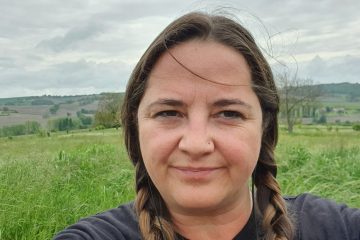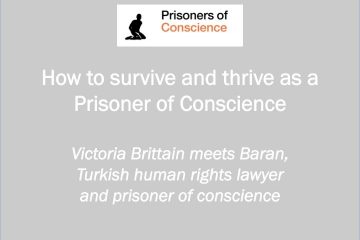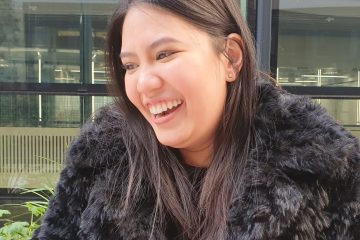Faheema’s* lifelong ambition has been to work as a pharmacist. Achieving that goal, however, has not been easy. Her story is one of danger, impossible choices and a 5,000-mile journey into the unknown.
“When in high school, I was very good at chemistry. Being a pharmacist is a dream from childhood,” she tells me over Skype from her university lab in Yorkshire.
Faheema worked hard and earned a place at the University of Khartoum in Sudan. After graduating, she joined a mobile clinic and would travel from village to village with a team of doctors and technicians, providing medical care to those who needed it.
Their work often took them into areas of civil unrest where they would meet people affected by conflict. One day in 2011, a group of people came to them for treatment. They were members of JEM – the Justice and Equality Movement, which is an anti-government faction involved in the conflict in Sudan’s western Darfur region.
Contact with JEM is strictly forbidden, and so the team had to make the difficult decision: provide medical care to the militia and put their own lives at risk or ignore them and let them suffer. They decided to treat them. Two days later, more people from JEM arrived who also needed care.
“While we were looking after them, the police came and arrested us at gun point. They threatened to shoot us and accused us of supporting JEM,” says Faheema. “We were blindfolded and taken to a detention centre where we were subjected to physical torture. The conditions were very difficult. The room was very small, without window. There was no bed, no anything. If we needed the toilet, we had to ask, but they would give us verbal and physical abuse before allowing us to go.”
For two days, Faheema and her colleagues – one of whom was her husband, who also worked as a pharmacist – endured the threats and abuse by the government guards. They then made them sign a confession admitting they were JEM supporters and took their fingerprints and photographs.
Back in the cell, Faheema was scared and wondering what was going to happen to them all. Then she heard shooting and suddenly they were all released. But their lives were still in danger.
“If we went home, the government would kill us. We had nowhere else to go so went with JEM to their camp,” she explains.
At the camp, they were able to call Faheema’s father-in-law who told them he had also been arrested and questioned about the medical team and their activities. He advised them to stay in the camp until he was able to find someone to help them. Three days passed before that happened.
“My father-in-law asked us to meet someone in a city. From there, we travelled from city to city until we got to the harbour on the east side of the country. It took 26 days. All the time it was different. We were put up in people’s houses and given food. It was very scary – at any time we could have been arrested and killed.”
Once at the harbour they were smuggled onto a cargo ship where they hid in a small dark room until eventually, 28 days after their original ordeal, they arrived in Belfast in Northern Ireland.
“We had nothing. All of our belongings had been taken from us when we were arrested. I was wearing light summer clothes but it was winter in Belfast. I had never experienced weather like that before. I was so cold, I couldn’t talk, only cry. I could not feel my hands or my feet.”
On arrival in Belfast, they declared themselves as asylum seekers and were put in the care of a charity who provided them with accommodation and warm clothing.
However, this wasn’t the end of Faheema’s struggles. The torture she had experienced and the stress of being forced to flee her country without being able to say goodbye to her family had caused deep psychological trauma. She miscarried three times, which worsened her depression.
“I stopped everything. I stopped learning English, I stopped seeing my friends, I stay at home all the time. But then I got pregnant with Amal.”
Faheema’s face lights up when she tells me about Amal. “Amal is a special angel. When I was pregnant, I had to go to hospital and stay in bed for five months, but I was patient because I didn’t want to lose her. After I had Amal, my life changed again. I dreamed of going back to my career, but the language barrier meant the prospect of requalifying was nearly impossible. So, I went back to college, I worked hard and studied English every day. I passed my university exam and applied for my Masters.”
The Masters course Faheema had chosen to take was in Yorkshire and so in 2017 she moved her with her daughter, leaving her husband behind in Belfast who wasn’t able to join her until much later. “It was very hard time as I was alone and looking after my daughter. My course was very hard and I was struggling from financial difficulties at the same time.”
It was at this time that Prisoners of Conscience was first able to help – providing Faheema with funding to cover the cost of childcare while she was studying.
When her potential was recognised by her professors and she was offered the opportunity to do a PhD on co-crystal manufacturing – something that would enable her to pursue a career in the British pharmaceutical industry – we stepped in to help her again by providing a bursary to cover the cost of the course.
“Without the support from Prisoners of Conscience, I wouldn’t have managed my studies or got a distinction as it enabled me to concentrate. You helped relieve all the stress about money and gave me the time to study without having to worry about childcare,” she tells me.
“Since I arrived here, it was a difficult time but because of the help I receive I build confidence and the ability to adapt to foreign situation. You and your country have given me the chance to be truly engaged in society and discover a new culture and language. I would like to thank you for everything you have given me. In the future, I will give back what I have received and help other students in the same way as you have helped me.”
* names have been changed to protect identities


